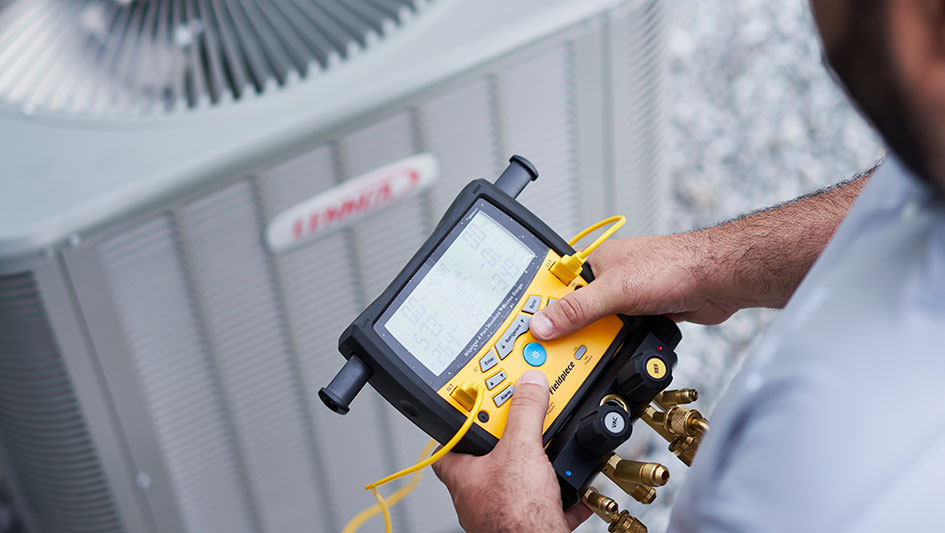
If you’re considering a new, high-paying career, look no further than heating, ventilation and air conditioning. HVAC is one of the most rapidly growing careers you can find, according to the U.S. Bureau of Labor Statistics, which estimates careers in this trade will increase by 13 percent by 2028.
There are several reasons why these positions are growing so quickly. One is homeowners taking advantage of government rebates to upgrade to more energy-efficient comfort systems. Then there’s the discontinuation of R-22 Freon® refrigerants, which affects old equipment. Lastly, there’s the red-hot home market and a property shortage that’s driven a boost in new construction houses.
One of the most needed jobs is working as an HVAC technician. Find out about what they do, how to become one and about how much you can expect to earn.
What Is a Professional HVAC Technician?
An HVAC technician is a person who repairs, installs and maintains heating and cooling systems. Most serve both homeowners and business owners. And, most important, you’ll be skilled with:
- Air conditioners
- Furnaces
- Mini-splits and heat pumps
- Thermostats and home zoning
- Indoor air quality products including air filters and air purification systems
Some are HVAC-R technicians, which means they also can do refrigeration.
Is HVAC a Hard Career?
While HVAC can be physically hard, it can also be extremely satisfying. As a technician you should be able to:
- Work in difficult settings, like small or dirty spaces.
- Work in hot or cold areas because equipment is usually outdoors.
- Work evenings, weekends and overtime during peak days.
One of the biggest misconceptions about HVAC is that it’s a blue-collar position. It requires a specific skill set, in-depth training and ongoing endorsements.
It’s a great career possibility if you want to:
- Not be saddled with a lot of educational debt.
- Avoid being stuck at a desk or in an office.
- Have job security knowing your position can’t be outsourced.
- Be your own boss and have your own successful business.
How You Can Start Your Careers as an HVAC Professional
To become an HVAC technician, you’ll need a high school diploma or GED, as well as comprehensive instruction. Other more specialized (and higher paying) HVAC positions typically require extra education or qualifications.
You can get your certification by going to classes at a community college or trade school. How long it takes to become an HVAC technician relies on the program, which is usually six months to two years. Your employer may also require NATE certification. Known as North American Technician Excellence, this top accreditation expands your technical know-how to help you better serve customers.
Career Explorer reports that technicians familiar with tablets, electronics and troubleshooting will be in big demand as equipment evolves.
Another advantage of working in HVAC is little to no instructional debt.
According to Midwest Technical Institute, attending a technical or trade school typically runs around $15,000. A community college typically costs around $5,000 annually. In comparison, the average student debt for a bachelor’s degree is $25,921.
A Typical Day of an HVAC Technician
Your work schedule could vary depending on your employer. If you do repairs, you might work early, late or be on call. If you work in construction/home building or management, you could have more of a set schedule during normal business hours.
As a technician, you’ll respond to different locations for repair, maintenance or installation jobs. Some tasks might take longer than others, so the number of calls you can go to could vary.
As we mentioned previously, you should be used to working outdoors in extreme weather, as well as in dirty or cramped areas. If you work in a customer-facing role, good customer service skills are always an advantage.
Average Salary for {Professional Technicians|Technicians|Full-Time Technicians and Other Careers in HVAC
As HVAC is a fast-growing industry, your salary will show it. The national average salary for an HVAC technician is $49,242, according to ZipRecruiter. Top earners make between $56,600 and $68,000. However, salaries may be different based on your location and its cost of living.
In addition to owning your own business, there are several extra career opportunities. These involve:
HVAC manager, $72,515 average salary
HVAC service manager, $71,176 average salary
Where HVAC Technicians Are in High Demand
HVAC technicians are in demand across the United States, but even more so in Florida, California, Texas, New York and Illinois. According to hvacclasses.org, these states employ the greatest number of HVAC workers and are dealing with high construction growth. Here’s why:
- Florida: Hurricanes, educational and healthcare locations.
- California: Wildfires, transportation, energy and utility upgrades.
- Texas: Hurricanes, energy, utility and other infrastructure updates.
- New York: Residential and infrastructure upgrades.
- Illinois: Companies moving to the Chicago area.
Where HVAC Technicians Will Be in High Demand in the Future
Projections Central, who develops long-term occupational projections, anticipates these states to have the greatest demand for technicians by 2028:
- Utah, 31.1%
- Colorado, 29.7%
- Nevada, 27.9%
- Arizona, 21.4%
- Iowa, Oregon and Montana, 18.5%
- Arkansas, 16.3%
- Florida, 16.2%
- South Carolina, 16%
- Texas, 15.9%
- Idaho, 15.7%
- Washington, 15.6%
- North Carolina, 15.5%
- Tennessee, 15.2%
- Wyoming, 14.3%
- Nebraska, 13.9%
- Indiana, 13.8%
- North Dakota, 13.8%
Here’s where the biggest number of new jobs during that time frame are expected to be:
- Florida, 5,420
- Texas, 5,530
- California, 4,100
- North Carolina, 2,510
- New York, 2,290
- Colorado, 2,000
- Ohio, 1,550
- Pennsylvania, 1,510
- Virginia, 1,500
- Tennessee, 1,360
- Washington, 1,290
- Georgia, 1,270
- New Jersey, 1,170
- Utah, 1,170
- South Carolina, 1,1060
- Indiana, 940
- Maryland, 820
- Missouri and Arizona, 810
- Michigan, 780
Weather and economic growth is forecasted to fuel growth in these states, according to hvacclasses.org.
Grow a Career in HVAC with Northwest Services
HVAC technicians are needed across the nation and in Toledo. To discover more about our openings, go to our careers page or reach us at 419-548-5017 now!
